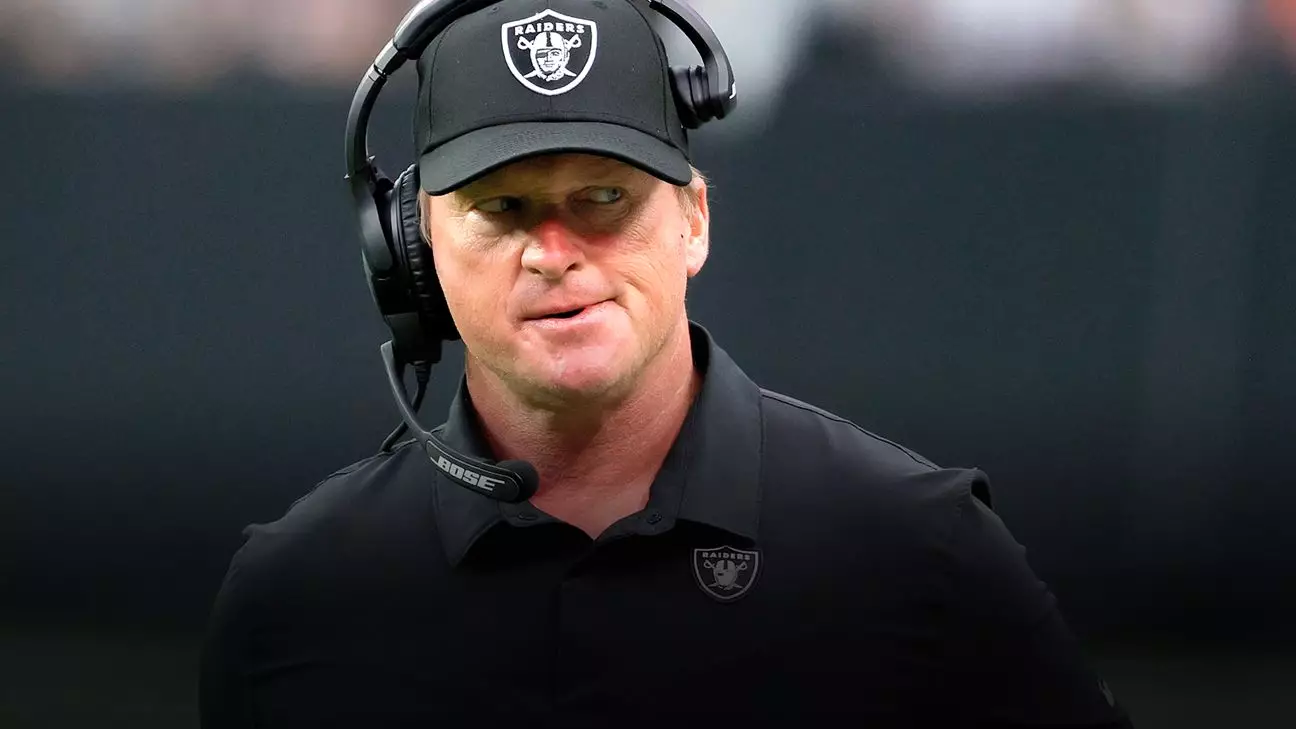The Las Vegas Raiders, a storied franchise in the National Football League (NFL), have navigated tumultuous waters in recent years. The abrupt resignation of head coach Jon Gruden in 2021, following the revelation of damaging emails that exposed a culture of racism and misogyny, sent shockwaves through the organization. With Gruden’s departure creating a leadership vacuum, Raiders owner Mark Davis recognized the urgent need for strength on the football side of the operation. Recently, that search for stability has led to the groundbreaking decision to bring in Tom Brady as a minority owner, reshaping the organization’s dynamics and ambitions for the future.
When Jon Gruden left the Raiders, it was not simply a coaching change; it was a seismic shift that left the franchise grappling for direction. Davis’s admission that he expected Gruden to serve as a stabilizing force underscores the weight of the responsibilities associated with leadership in professional sports. Gruden’s initial tenure with the Raiders from 1998 to 2001 had instilled optimism, but upon his return, the expectations were dashed, leading to a dismal record of 22-31. His exit created a void that the organization struggled to fill, attempting multiple coaching strategies, first by hiring Josh McDaniels and subsequently Antonio Pierce. However, these attempts failed to yield the revival that fans and management alike had hoped for.
Davis has openly articulated his desire for an organizational overhaul, a shift he believes can be catalyzed by Brady’s involvement. By integrating a figure of Brady’s caliber, who boasts an unparalleled legacy of success with seven Super Bowl championships, the Raiders have signaled not only a change in ownership dynamics but a strategic investment in their future. Brady’s presence represents more than just prestige; it embodies a connection to a winning pedigree that the Raiders desperately need to reshape their identity.
Brady’s transition into the role of minority owner is historic and laden with significance. Traditionally, owner positions have not included functional responsibilities related to team operations; however, Brady’s involvement is expected to transcend traditional confines. Davis revealed that Brady participated in interviewing potential candidates for head coaching positions, indicating a direct influence on the team’s leadership structure. This collaborative approach may prove pivotal.
With new head coach Pete Carroll and general manager John Spytek at the helm, the Raider’s management appears oriented towards creating a cohesive vision that marries Brady’s competitive mindset with the organizational structure. Carroll’s wealth of experience, particularly in developing talent and leading teams, could complement Brady’s insights, setting the stage for a revitalized culture focused on performance and accountability.
While the excitement surrounding Brady’s association with the Raiders is palpable, Davis emphasizes that the path to success will require patience. He recognizes that revitalizing a struggling franchise is a gradual process, echoing a mindset that prioritizes methodical improvement over immediate results. The franchise finished the previous season with a disappointing 4-13 record, causing fans to question the direction of the team. Yet, Davis remains hopeful that the combination of Carroll, Spytek, and Brady can initiate a turnaround.
Moreover, transparency about the current state of the team and a commitment to building from the ground up are essential in regaining fan trust and community support. The Raiders have been mired in chaos; thus, fostering an environment where players and employees feel valued is crucial for healing and growth. By making informed decisions and cultivating talent through a stable leadership approach, the franchise can forge a new path.
In essence, the Raiders stand at a crossroads, with the potential to emerge stronger and united. The partnership of Tom Brady and the newly appointed coaching staff offers a glimpse into a hopeful future for the franchise—characterized by resilience, accountability, and a renewed competitive spirit. The legacy of the Raiders may soon evolve, but it will undoubtedly be rooted in a collective commitment to excellence and a departure from the turmoil of the past.


Leave a Reply